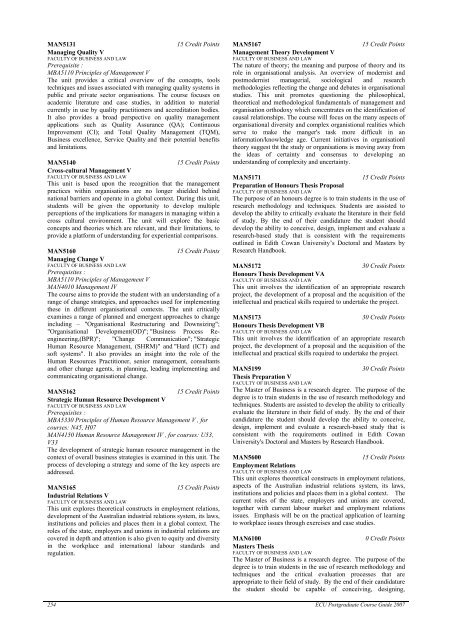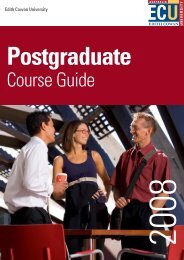Course Guide - Edith Cowan University
Course Guide - Edith Cowan University
Course Guide - Edith Cowan University
Create successful ePaper yourself
Turn your PDF publications into a flip-book with our unique Google optimized e-Paper software.
MAN5131<br />
15 Credit Points<br />
Managing Quality V<br />
FACULTY OF BUSINESS AND LAW<br />
Prerequisite :<br />
MBA5110 Principles of Management V<br />
The unit provides a critical overview of the concepts, tools<br />
techniques and issues associated with managing quality systems in<br />
public and private sector organisations. The course focuses on<br />
academic literature and case studies, in addition to material<br />
currently in use by quality practitioners and accreditation bodies.<br />
It also provides a broad perspective on quality management<br />
applications such as Quality Assurance (QA); Continuous<br />
Improvement (CI); and Total Quality Management (TQM),<br />
Business excellence, Service Quality and their potential benefits<br />
and limitations.<br />
MAN5140<br />
15 Credit Points<br />
Cross-cultural Management V<br />
FACULTY OF BUSINESS AND LAW<br />
This unit is based upon the recognition that the management<br />
practices within organisations are no longer shielded behind<br />
national barriers and operate in a global context. During this unit,<br />
students will be given the opportunity to develop multiple<br />
perceptions of the implications for managers in managing within a<br />
cross cultural environment. The unit will explore the basic<br />
concepts and theories which are relevant, and their limitations, to<br />
provide a platform of understanding for experiential comparisons.<br />
MAN5160<br />
15 Credit Points<br />
Managing Change V<br />
FACULTY OF BUSINESS AND LAW<br />
Prerequisites :<br />
MBA5110 Principles of Management V<br />
MAN4010 Management IV<br />
The course aims to provide the student with an understanding of a<br />
range of change strategies, and approaches used for implementing<br />
these in different organisational contexts. The unit critically<br />
examines a range of planned and emergent approaches to change<br />
including – "Organisational Restructuring and Downsizing";<br />
"Organisational Development(OD)"; "Business Process Reengineering,(BPR)";<br />
"Change Communication"; "Strategic<br />
Human Resource Management, (SHRM)" and "Hard (ICT) and<br />
soft systems". It also provides an insight into the role of the<br />
Human Resources Practitioner, senior management, consultants<br />
and other change agents, in planning, leading implementing and<br />
communicating organisational change.<br />
MAN5162<br />
15 Credit Points<br />
Strategic Human Resource Development V<br />
FACULTY OF BUSINESS AND LAW<br />
Prerequisites :<br />
MBA5330 Principles of Human Resource Management V , for<br />
courses: N45, H07<br />
MAN4150 Human Resource Management IV , for courses: U53,<br />
V33<br />
The development of strategic human resource management in the<br />
context of overall business strategies is examined in this unit. The<br />
process of developing a strategy and some of the key aspects are<br />
addressed.<br />
MAN5165<br />
15 Credit Points<br />
Industrial Relations V<br />
FACULTY OF BUSINESS AND LAW<br />
This unit explores theoretical constructs in employment relations,<br />
development of the Australian industrial relations system, its laws,<br />
institutions and policies and places them in a global context. The<br />
roles of the state, employers and unions in industrial relations are<br />
covered in depth and attention is also given to equity and diversity<br />
in the workplace and international labour standards and<br />
regulation.<br />
MAN5167<br />
15 Credit Points<br />
Management Theory Development V<br />
FACULTY OF BUSINESS AND LAW<br />
The nature of theory; the meaning and purpose of theory and its<br />
role in organisational analysis. An overview of modernist and<br />
postmodernist managerial, sociological and research<br />
methodologies reflecting the change and debates in organisational<br />
studies. This unit promotes questioning the philosophical,<br />
theoretical and methodological fundamentals of management and<br />
organisation orthodoxy which concentrates on the identification of<br />
causal relationships. The course will focus on the many aspects of<br />
organisational diversity and complex organistional realities which<br />
serve to make the manger's task more difficult in an<br />
information/knowledge age. Current initiatives in organisationl<br />
theory suggest tht the study or organisations is moving away from<br />
the ideas of certainty and consensus to developing an<br />
understanding of complexity and uncertainty.<br />
MAN5171<br />
15 Credit Points<br />
Preparation of Honours Thesis Proposal<br />
FACULTY OF BUSINESS AND LAW<br />
The purpose of an honours degree is to train students in the use of<br />
research methodology and techniques. Students are assisted to<br />
develop the ability to critically evaluate the literature in their field<br />
of study. By the end of their candidature the student should<br />
develop the ability to conceive, design, implement and evaluate a<br />
research-based study that is consistent with the requirements<br />
outlined in <strong>Edith</strong> <strong>Cowan</strong> <strong>University</strong>’s Doctoral and Masters by<br />
Research Handbook.<br />
MAN5172<br />
30 Credit Points<br />
Honours Thesis Development VA<br />
FACULTY OF BUSINESS AND LAW<br />
This unit involves the identification of an appropriate research<br />
project, the development of a proposal and the acquisition of the<br />
intellectual and practical skills required to undertake the project.<br />
MAN5173<br />
30 Credit Points<br />
Honours Thesis Development VB<br />
FACULTY OF BUSINESS AND LAW<br />
This unit involves the identification of an appropriate research<br />
project, the development of a proposal and the acquisition of the<br />
intellectual and practical skills required to undertake the project.<br />
MAN5199<br />
30 Credit Points<br />
Thesis Preparation V<br />
FACULTY OF BUSINESS AND LAW<br />
The Master of Business is a research degree. The purpose of the<br />
degree is to train students in the use of research methodology and<br />
techniques. Students are assisted to develop the ability to critically<br />
evaluate the literature in their field of study. By the end of their<br />
candidature the student should develop the ability to conceive,<br />
design, implement and evaluate a research-based study that is<br />
consistent with the requirements outlined in <strong>Edith</strong> <strong>Cowan</strong><br />
<strong>University</strong>'s Doctoral and Masters by Research Handbook.<br />
MAN5600<br />
15 Credit Points<br />
Employment Relations<br />
FACULTY OF BUSINESS AND LAW<br />
This unit explores theoretical constructs in employment relations,<br />
aspects of the Australian industrial relations system, its laws,<br />
institutions and policies and places them in a global context. The<br />
current roles of the state, employers and unions are covered,<br />
together with current labour market and employment relations<br />
issues. Emphasis will be on the practical application of learning<br />
to workplace issues through exercises and case studies.<br />
MAN6100<br />
0 Credit Points<br />
Masters Thesis<br />
FACULTY OF BUSINESS AND LAW<br />
The Master of Business is a research degree. The purpose of the<br />
degree is to train students in the use of research methodology and<br />
techniques and the critical evaluation processes that are<br />
appropriate to their field of study. By the end of their candidature<br />
the student should be capable of conceiving, designing,<br />
254 ECU Postgraduate <strong>Course</strong> <strong>Guide</strong> 2007



